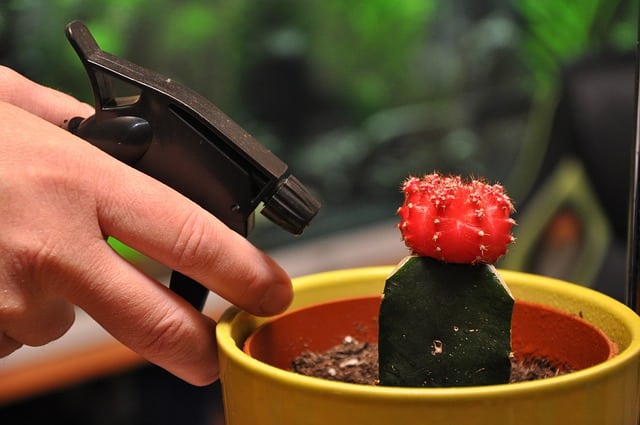Introduction – Organic Pesticides
In this article we will be discussing the rationale of using organic pesticide for garden. ShrinkThatFootprint is an advocate of sustainable food practices including local growing in your garden to avoid carbon emissions from food transportation. Keeping your garden shielded from the attacks of pests is important for the health and maintenance of your carbon reducing food source plants. Using pesticides is one way to achieve this, but it is important to remember that not all pesticides are created equal.
To choose the best pesticide for your garden, you need to consider the type of pests you are dealing with and the size and type of plants you are trying to protect. You must remember that before using any pesticides in your garden, it is important to read the label carefully and follow the directions for safe use.
Common pesticides contain chemicals that have unclear effects on people, so one way to circumvent the uncertainty of these chemicals is to go with an organic pesticide for the garden that have less of these unknowns.
Whether or not you use an organic pesticide, it’s best to wear gloves and a mask to avoid inhaling the chemicals when using any type of pesticide. In addition, be sure to keep children and pets away from the area until the pesticide has dried completely. With a little bit of research, you should be able to find an organic pesticide for the garden that will work well for your specific needs.

7 Organic Pesticides For The Garden
Organic pesticide formulations have been used for centuries in various parts of the world. Organic pesticides are derived from plant, mineral, or microbial sources and are generally considered safe when used as directed.
Organic pesticides can be an important part of an Integrated Pest Management program that uses various cultural, physical, and biological methods to manage pests. Organic pesticides may not be as effective as synthetic pesticides in controlling pests, but they can be safer for people and the environment.
Some organic pesticides are OMRI-listed, which means they meet the standards set by the Organic Materials Review Institute for use in organic production. When selecting an organic pesticide, it is important to choose one that is effective against the target pest and compatible with your other pest management strategies.
Before using any pesticide, you should also consider the potential risks to people, animals, and the environment. Here are 7 organic pesticides that are OMRI-listed and considered safe for use in gardens:
1.Bacillus thuringiensis (BT)
BT is a naturally occurring soil bacterium that produces proteins that are toxic to some insects. BT products are available as dust, wettable powders, or liquid concentrates. They are most effective when applied to young caterpillars before they cause significant damage to plants. BT is not harmful to people, animals, or beneficial insects. BT is effective against caterpillars of moths and butterflies, including cabbage loopers, tomato hornworms, and gypsy moth caterpillars.
2. Neem
Neem is a tree native to India and other parts of Asia. The neem tree produces natural oil used for centuries in India for its medicinal properties. Neem oil is also effective as an organic pesticide. It disrupts the life cycle of insects and can control a wide variety of pests, including aphids, whiteflies, and caterpillars. Neem oil is safe for people and animals but can harm bees if used when plants bloom.
3. Pyrethrin
Pyrethrin is a naturally occurring insecticide that is derived from the flowers of certain types of chrysanthemums. Pyrethrin products are available as aerosols, specks of dust, or liquids. They are most effective when applied directly to insects. Pyrethrin is considered safe for people and animals but can harm bees and other beneficial insects if used when plants bloom.
4. Salt Spray
Salt spray is one of the best organic pesticides for a garden. Salt is a desiccant, which means it absorbs moisture from the air. This makes it an ideal agent for killing pests and preventing them from returning. Salt also has antifungal properties, which make it effective against powdery mildew and other fungal diseases.
In addition, salt is non-toxic to humans and animals, making it a safe choice for use around children and pets. Mix one tablespoon of salt with two cups of water to use a salt spray as a pesticide. Then, add the mixture to a spray bottle and apply it to the affected area. For best results, apply the spray when pests are most active in the evening.
5. Onion And Garlic Spray
Onion And Garlic Spray is another best organic pesticide for the garden because it effectively kills a wide variety of pests, including aphids, thrips, whiteflies, and mites. Onion And garlic spray also repels many animals, such as rabbits, deer, and groundhogs.
To make onion and garlic spray, finely chop one onion and one garlic clove and steep in boiling water for 30 minutes. Strain the mixture and add one tablespoon of dish soap. Pour the mixture into a clean spray bottle and use it as needed. Apply the spray early or late in the evening when pests are most active. Reapply after rain or as needed. Onion And garlic spray can also be used as a preventative measure by spraying around the perimeter of your garden to keep pests away.

6. Eucalyptus Oil
Eucalyptus Oil is an organic pesticide for the garden because it is a natural insecticide. Eucalyptus oil is lethal to many insects, including mosquitoes, fleas, and ticks. Eucalyptus oil also repels ants, cockroaches, and other pests. Eucalyptus oil is safe for humans and pets, and it is also biodegradable. You can use eucalyptus oil indoors or outdoors.
To use eucalyptus oil as an insecticide, mix 1 teaspoon of eucalyptus oil with 1 cup of water. Spray the mixture onto your plants or where you see pests. Eucalyptus oil can also be used as a deterrent: mix 1 tablespoon of eucalyptus oil with 1 quart of water and spray it around the perimeter of your home to keep pests out.
7. Horticultural Oil
Horticultural oil is an excellent organic pesticide for the garden. Horticultural oil is a natural, plant-based, safe product for children and pets. Horticultural oil works by smothering insects and their eggs, and you can apply it directly to the leaves of plants.
Horticultural oil is most effective when used in the early spring before insects can lay their eggs. Horticultural oil is also effective against fungal diseases, such as powdery mildew and black spot. When used as directed, horticultural oil will not harm beneficial insects like ladybugs and bees. Horticultural oil is an environmentally friendly way to control pests in the garden.
Wrapping Up – Organic Pesticide For Garden
In conclusion, these are some of the best organic pesticides for the garden. Organic pesticides are safe for humans and animals, and they are also biodegradable. Organic pesticides effectively control a wide variety of pests, including aphids, thrips, whiteflies, and mites. In addition, organic pesticides can also be used as a preventative measure by spraying around the perimeter of your garden to keep pests away. When using any pesticide, always read the label carefully and follow the directions.
